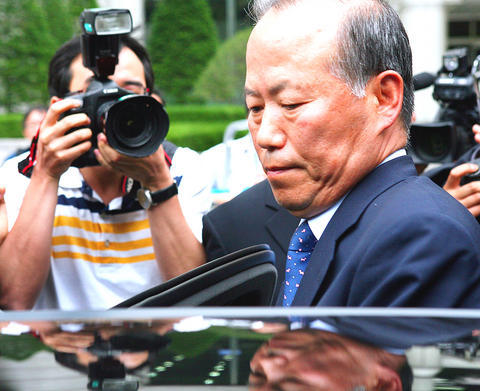An appeals court yesterday upheld the conviction of two Samsung executives for helping the chairman of South Korea's biggest group transfer control to his son through an illicit bond deal.
The Seoul High Court endorsed guilty verdicts against Huh Tae-hak and Park Ro-bin for selling a controlling stake in the group's holding company to the son of group chairman Lee Kun-hee at a discounted price.
A lower court in 2005 had sentenced Huh and Park, the former and current presidents of the holding firm Samsung Everland, to suspended jail terms of three and two years respectively for breach of duty.

PHOTO: AP
The appeal court confirmed Huh's sentence and increased Park's suspended jail term to three years.
The case focuses on a 1996 transaction at Samsung Everland, which helped Lee Kun-hhee pass control of the family-run group to his only son, Lee Jae-yong.
The younger Lee bought 1.25 million Samsung Everland shares at 7,700 won (US$8.20) per share -- far lower than the market price at the time -- via an issue of convertible bonds.
The appellate court said the accused had sold the bonds to the son at a "remarkably low price" and the stock should have cost 14,825 won per share or more.
It also said a board meeting in October 1996 that approved the bond sale was invalid because not enough directors attended.
"It is clear that the accused have breached their official duty," the court said in a statement, adding it would make no ruling on whether the elder Lee was personally involved in setting the bond price at an excessively low level.
The son's purchase sparked protests from activists including law professors, who filed a complaint with prosecutors against Samsung chairman Lee in 2000.
"The significance of [yesterday's] ruling is that the appeals court has confirmed Lee Jae-yong's succession had been carried out through illicit means," said Kim Young-hee, director of activist group Solidarity for Economic Reform.
She urged the Lees to return the "illicitly acquired gains" to the company and other shareholders.
"The Samsung Group must embark on reforming its corporate governance structure," she said.
A lawyer for the accused said they would appeal to the South Korean Supreme Court.
Even if the Supreme Court upholds the lower courts' findings, Kim said, the 26 percent stake in Everland currently held by Lee Jae-yong cannot be nullified because of the statute of limitations.
But analysts say the case will be an obstacle if Lee Jae-yong, 39, tries to assume formal leadership of the group, whose US$150 billion in annual sales amount to 17 percent of the country's total economic output.
Samsung Everland controls the group through a large web of ownership that includes a 19.3 percent controlling stake in Samsung Life Insurance.
Samsung Life has a 7.3 percent stake in Samsung Electronics, which in turn owns 47 percent of Samsung Card. Samsung Card has a 26 percent stake in Samsung Everland in what is known as a circular chain of ownership.
After the East Asian financial crisis struck in 1997, South Korea launched a drive to reform corporate governance at the conglomerates. Despite relatively small direct holdings, many founding families still maintain a grip over their empires through complicated chains of investment.
Hyundai Motor chairman Chung Mong-koo is currently appealing against convictions and a jail term.

The paramount chief of a volcanic island in Vanuatu yesterday said that he was “very impressed” by a UN court’s declaration that countries must tackle climate change. Vanuatu spearheaded the legal case at the International Court of Justice in The Hague, Netherlands, which on Wednesday ruled that countries have a duty to protect against the threat of a warming planet. “I’m very impressed,” George Bumseng, the top chief of the Pacific archipelago’s island of Ambrym, told reporters in the capital, Port Vila. “We have been waiting for this decision for a long time because we have been victims of this climate change for

Rainfall is expected to become more widespread and persistent across central and southern Taiwan over the next few days, with the effects of the weather patterns becoming most prominent between last night and tomorrow, the Central Weather Administration (CWA) said yesterday. Independent meteorologist Daniel Wu (吳德榮) said that based on the latest forecast models of the combination of a low-pressure system and southwesterly winds, rainfall and flooding are expected to continue in central and southern Taiwan from today to Sunday. The CWA also warned of flash floods, thunder and lightning, and strong gusts in these areas, as well as landslides and fallen

MASSIVE LOSS: If the next recall votes also fail, it would signal that the administration of President William Lai would continue to face strong resistance within the legislature The results of recall votes yesterday dealt a blow to the Democratic Progressive Party’s (DPP) efforts to overturn the opposition-controlled legislature, as all 24 Chinese Nationalist Party (KMT) lawmakers survived the recall bids. Backed by President William Lai’s (賴清德) DPP, civic groups led the recall drive, seeking to remove 31 out of 39 KMT lawmakers from the 113-seat legislature, in which the KMT and the Taiwan People’s Party (TPP) together hold a majority with 62 seats, while the DPP holds 51 seats. The scale of the recall elections was unprecedented, with another seven KMT lawmakers facing similar votes on Aug. 23. For a

All 24 lawmakers of the main opposition Chinese Nationalists Party (KMT) on Saturday survived historical nationwide recall elections, ensuring that the KMT along with Taiwan People’s Party (TPP) lawmakers will maintain opposition control of the legislature. Recall votes against all 24 KMT lawmakers as well as Hsinchu Mayor Ann Kao (高虹安) and KMT legislative caucus whip Fu Kun-chi (傅崐萁) failed to pass, according to Central Election Commission (CEC) figures. In only six of the 24 recall votes did the ballots cast in favor of the recall even meet the threshold of 25 percent of eligible voters needed for the recall to pass,